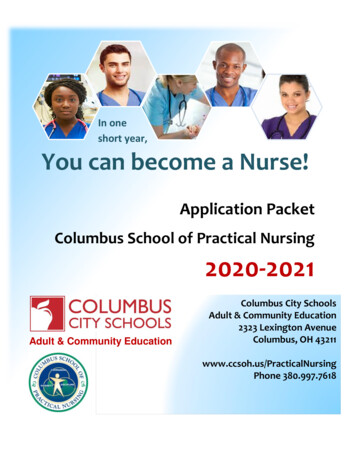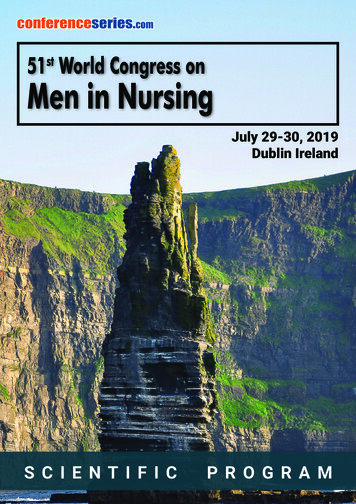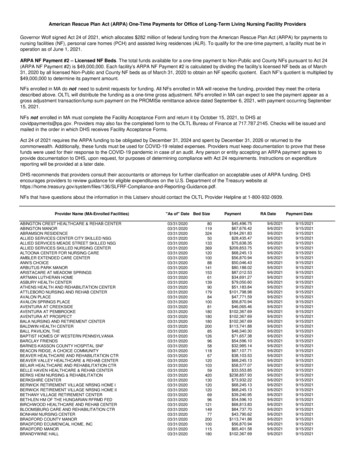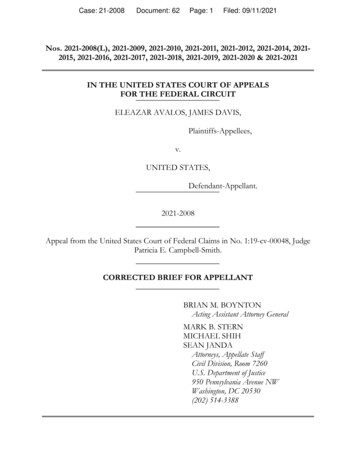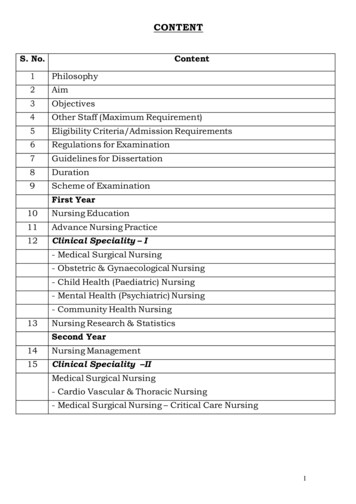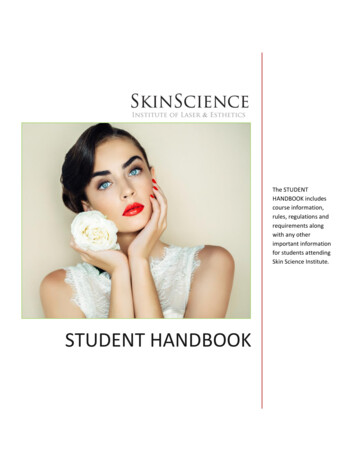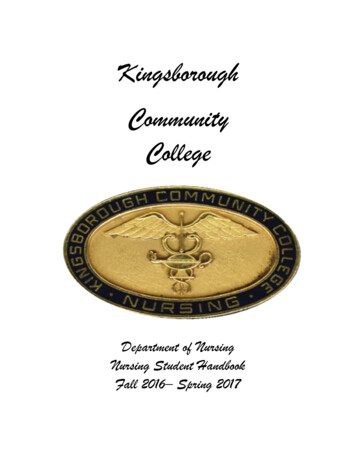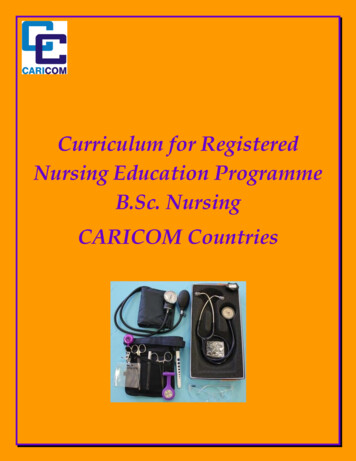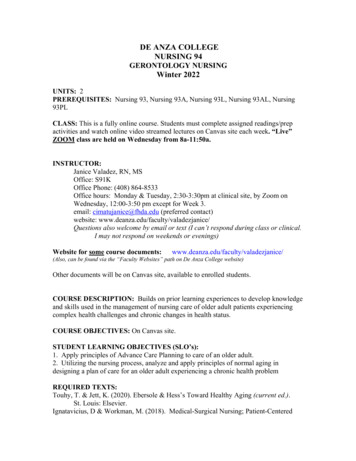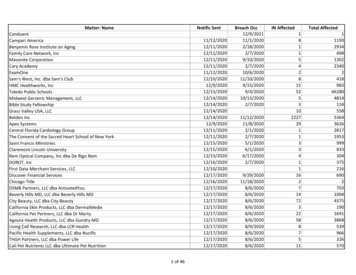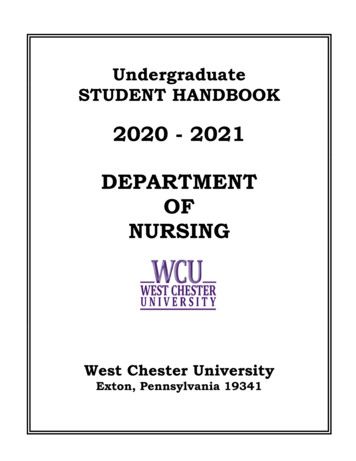
Transcription
UndergraduateSTUDENT HANDBOOK2020 - 2021DEPARTMENTOFNURSINGWest Chester UniversityExton, Pennsylvania 19341
STUDENT HANDBOOKPUBLISHED August 2020DEPARTMENT OF NURSINGWEST CHESTER UNIVERSITY of PA930 E. Lincoln Highway, Suite 100, Exton, PA 19341Telephone: 610-436-2219FAX: 610-436-3083The Department of Nursing of West Chester University of PA, is approved by the StateBoard of Nursing of theCommonwealth of Pennsylvania, and accredited by theCommission on Collegiate Nursing EducationOne DuPont Circle, NW, Suite 530Washington, DC 20036-1120202-887-6791 FAX: 202-887-8476www.aacn.nche.edu* The provisions of this handbook are not to be regarded as an irrevocable contractbetween the student and the West Chester University Department of Nursing. TheDepartment of Nursing reserves the right to change any provisions or requirementsat any time.
1TABLE OF CONTENTSPageI.IntroductionA.B.II.Nursing ProgramA.B.C.D.E.F.G.H.I.J.III.Letter from Chairperson . .4Faculty and Staff . 5Purposes. 7Mission and Philosophy Statements . 8Conceptual Framework. 10Program and Level Objectives . 13Department of Nursing Communication Relationship . . .16Sequence of Courses & Advisement Sheet . 17Advance 2 BSN Advisement Form . 20Nursing Course Descriptions . 21Clinical Facilities . 24Clinical Agencies:(NSL 311-312, NSL 411-412). 25Overall Program RequirementsA.B.C.D.E.F.G.H.I.J.Admission Criteria . 28Technical Standards Policy. 28Academic Progression . 33Academic Achievement and Promotion . 34Nursing Class Attendance Policy . 35Electronic Device Policy . 35Academic Support Policy . 36Student Records and Advisement1.Departmental . 362.Academic Advising and Counseling . 373.Services to Accommodate Students with Disabilities . 374.Financial Aid . 385.Scholarships . 38Academic Dishonesty Policy . 39Graduation1.NCLEX . 392.Application for Licensure . 403.Outcome Assessments . 40i.
2TABLE OF CONTENTS (Continued)PageIV.Clinical RequirementsA.B.C.D.E.F.G.H.I.J.V.Requirements for all Nursing Students Prior to Clinical Practicum’s . 421.All Course Pre-requisites as stated in Academic Policies & Clinical Compliances . 422.CPR Certification . 423.Liability Insurance . 424.Criminal and PA Child Abuse History Clearance . 425.Substance Abuse Policy . 43Drug Test Form . 446.FBI Check . 457.Health Requirements . 458.Health Insurance . 46Additional Requirement(s) for all Nursing Students .46Entering First Clinical Program . 461.Calculations Test Policy . 46Student Guidelines for Communicable Diseases . 461.Introduction . 462.Communicable Disease Policy . 463.Pre-requisite Clinical “Consent to Release” Form . 48Standards of Safe Clinical Practice . 491.Violation of Standards of Safe Clinical Practice Form . 522.Injury/Incident Form . 53Clinical Attendance Policy . 54Attendance at Professional Conferences . 54Transportation to Clinical Agencies . 55Dress Code (Uniforms, etc.) . 55Social Media . 56Student Employment . 56Student ActivitiesA.B.C.D.E.F.G.H.I.Class Officers . 59Student Officers . 59Student Affairs Committee . 60Fundraising Activities . 60SNAP . 60Mary Kline Lecture & Professional Day . 61Sigma Theta Tau. 61Pins. 61Awards1.Faculty Award . 622.Academic Excellence Award . 623.The DAISY Award for Extraordinary Nursing Students . 62ii
3I.Introduction
4August, 2020Dear Nursing Students,On behalf of the Nursing Faculty at West Chester University, we extend a warm welcome to you.You were exceptional applicants who have chosen to pursue your baccalaureate education atWest Chester University.This student handbook will familiarize you with the Department of Nursing policies, procedures,and information that is critical to your success within the nursing program. This handbookprovides information, which helps you to navigate efficiently through the nursing programrequirements. Also, the handbook contains activities and clubs associated with the nursing major.The Department has a variety of opportunities for you to become involved with socially,academically and professionally. Some opportunities include Pennsylvania Student Nurses’Association (SNAP), Xi Delta Chapter of Sigma Theta Tau International Honor Society, and peermentoring and or tutoring.Annually the Department offers the Mary Kline Lecture Day Series, which is a professionalworkshop where nurses, nursing alumni, nursing faculty and students attend a continuingeducation event. The Mary Kline Day allows nursing students from across levels and programs togather, socialize and discuss relevant nursing topics.The Department welcomes students to attend and participate in select Nursing meetings. Studentinput is welcomed and valued. Student input is a key component for course and programimprovement. Student input is critical the University’s Strategic Plan, the Department’sSystematic Evaluation Plan and ongoing accreditation processes.Each student has been assigned an advisor to assist them to navigate the nursing curriculum andprogram at West Chester. Students will be contacted to meet with their advisor shortly afterentering the nursing program. Advisors help guide students to take the correct courses for the nursingmajor but encourage students to take courses that interest them. Many students complete minors inspecialty concentrations. Students are encouraged to maintain a relationship with their advisors.Please note that our Department’s purpose, mission and philosophy is to help each student succeed atWest Chester as a Nursing student. Nursing faculty and staff look forward to meeting each of you. Ourcollective goal is that you are prepared to pass your nursing boards on the completion of this highlyacclaimed program.Again, a warm welcome and I am so glad that you have joined us at West Chester!Sincerely,Cheryl SchlambDr. Cheryl Schlamb DNP, CRNPAssociate ProfessorChair, Department of NursingWest Chester University of Pennsylvania
5FACULTYAll faculty, staff and Nursing Lab Coordinator of the Nursing Department are located at the Exton location,930 Lincoln Highway, Exton, PA 19341ROOMTELEPHONEMarguerite Ambrose, PhD, RN, ACNS, BC, CNETBDTBDNancy Barker, Ed.D, MSN, RN, CHSE103436-6979Daniel Bileth, MSN, RN, CPNTBDTBDDonna Bohs, MSN, RN118436-2219Barbara Harrison McPherson, PhD, CRNP, GS-C, FGSA120430-4195Michelle Kaulback, Ed.D., RN, FNP-BC116436-2258Michelle Kensey, DNP, RN, CNS, CNE105436-0548Charlotte Mackey, Ed.D., MSN, RN,119436-3474Debra Mandel, PhD, MSN, RNC-OB115436-3488Julie McCulloh Nair, PhD, RN, APHN-BC, CCRE.112436-2331Carolyn Meehan, PhD, CRNP, Pre-Licensure Coordinator104436-3204Cheryl Monturo, PhD, MBE, ACNP-BC,110436-2693Megan Mraz, PhD, MSN, RN, Assistant Chair109430-4408Norine (Nina) Pulliam, PhD, MSN, PHCNS-BC, RN117436-6918Cheryl Schlamb, DNP, CRNP, Chair, Graduate Coord.111738-0544Lauren Stoltzfus, DNP, RN, CNE127436-2692John Taylor, DNP, RN-BC, CPN106436-6964Christine Thomas, PhD, RN, CHSE, Faculty Simulation Coordinator130738-0545Christina Von Colln-Appling, MSN, RN, PhD(c)125436-3473Adrienne Wharry, MSN, RN, CCRN113436-2323Veronica Wilbur, PhD, RN, APRN-FNP, CNE, FAANP107436-2839Danielle Yocom, DNP, RN, FNP-BC123738-0549STAFFCatherine McKenna, MSN, RN, CHSE, Staff Lab Coordinator130436-2219Stacey Pedicone, Department Secretary101436-2219
6II.Nursing Program
7PURPOSESThe purposes of the West Chester University baccalaureate-nursing program are:1.To prepare baccalaureate registered nurses for clinical practice.2.To develop the ability to function as a self-directed professional capable ofassuming leadership in present and emerging health care roles.3.To enhance personal responsibility for being a useful, contributingmember of society.4.To encourage the continuing process of personal development.5.To provide the basis for graduate study and lifelong learning.
8Mission Statement & PhilosophyMISSIONThe mission of the West Chester University Department of Nursing is to provide the highest qualityof undergraduate and graduate nursing education to students who come from diverse populations.All graduates are prepared to provide evidence-based quality nursing care, and to become nursingleaders within the nursing profession. The baccalaureate program provides the art and scientificfoundations of entry into nursing practice. The graduate programs provide preparation into advancednursing practice and education roles; thereby, giving students the ability to synthesize knowledge,strengthen communication, and empowerment to promote health care. The Doctor of NursingPractice program further prepares advanced practice nurses at the highest level to fully evaluate andcontribute to increasingly complex health care systems. These contributions are based oncontemporary nursing science, organizational, political, cultural and economic principles. Graduatesof these nursing programs will be professionals capable of assuming leadership in present andemerging health care roles, citizens who contribute to society and who are committed to life-longlearning and personal development.PHILOSOPHYThe Department of Nursing affirms the WCU Vision, Mission and Values Statements and theCollege of Health Sciences Mission Statement. It shares the University’s commitment to teaching,research, and service to individuals, families, communities and populations. The followingstatement reflects the Department of Nursing’s philosophical beliefs.The Department of Nursing recognizes that individuals, families, communities and populations areentitled to optimum health and quality health care. Nurses play an integral role in health promotion,disease prevention and enhancing the quality of life throughout the lifespan. According to the ANA“nursing is the protection, promotion and optimization of health and abilities, prevention of illnessand injury, alleviation of suffering through the diagnosis and treatment of human response andadvocacy in the care of individuals, families, communities and populations.” Advanced practicenursing roles include expert clinician, educator, researcher, consultant and leader. The nursingprograms at West Chester University recognizes the responsibility to provide innovative educationalprograms that reflect the growing needs and current trends of diverse populations.The faculty of the Department of Nursing provides a caring and supportive environment whilerespecting the diversity of the student body and communities which it serves. The Universitycommunity cultivates and supports faculty/student collaboration and mentoring. The students aretreated as individuals with unique qualities and learning needs. Through professional actions, thefaculty reflects the department’s philosophy of excellence in nursing practice, creation of evidencebased research, establishing strong interdisciplinary associations and fostering supportiverelationships with colleagues, students and the community.The 2008 AACN Essentials document (The Essentials of Baccalaureate Education), the 2011AACN Essentials document (The Essentials of Master’s Education), and the 2006 AACN Essentialsdocument (The Essentials of Doctoral Education for Advanced Nursing Practice) provide structurefor the curriculum content of all programs. The faculty designed all programs to facilitate thestudents’ abilities to creatively respond to a continuously changing health system. Innovativeeducational experiences are cooperatively planned to meet the needs of both the
9students and clients empowering them in the nursing-client partnership. The interpretation,development and implementation of ethical evidence-based research are stressed throughout theeducational process.Ethical decision making, accountability, critical thinking, and effective communication skills areemphasized. This is achieved by the application of nursing theory and empirical evidence toprofessional practice. All programs promote lifelong learning, leadership, and prepare the studentfor advance professional degrees or post-doctoral studies.December 2015RevisedRevised19911996199820012002201120142015
10CONCEPTUAL FRAMEWORKThe nursing curriculum utilizes a holistic caring model for the study of person, environment,health, and nursing. The horizontal and vertical strands serve to organize content around multipletheories and concepts that have been drawn from physical, psychological, cultural, social, andnursing sciences.Five horizontal strands can be identified in all the nursing courses. They include: the holisticperson adapting throughout the life cycle; the nursing process; nursing theory; legal- ethical issues;and teaching-learning principles. A description of the way each is implemented follows.The holistic person adapting throughout the life cycle. While moving through the lifespan, one adapts continuously to internal and external stimuli. The understanding of adaptationalresponses is basic to the students' knowledge and professional practice.The nursing process. Students use the nursing process to assess, plan, intervene, andevaluate the responses of assigned clients. Course objectives describe the depth to which thestudents utilize the nursing process.Nursing theory. Through academic and clinical assignments, students learn to apply nursingtheory to professional practice, and analyze the quality of care provided with emphasis onrelationship based care.Legal-ethical issues. These issues are an inherent part of all professional nursing practice.Inclusion of the legal- ethical dimension of nursing in all courses encourages values clarification,fosters accountability, and enhances decision- making.Teaching-learning principles. An understanding of teaching-learning principles isfundamental to the provision of health care. Students learn to apply skills of counseling, therapeuticcommunication, and health promotion in increasingly complex situations.The vertical strands which provide structure to the curriculum are:Health status -wellness to less well to crisisFocus of care- prevention to health promotion to restorationRecipient of care - individual to family to communityProvider of care – Relationship Based CareLeadership role - collaboration to coordination to managementResearch application - need identification to information gathering to informationanalysis
11The health status strand focuses on the client's adaptive responses to stress. The studentapplies knowledge, psychomotor skills, and attitudes learned in the care of well/less well clients tothe care of clients in crisis situations. Emphasis is also placed on the students' ability to evaluatepersonal reactions to increasingly complex nursing process operations.The focus of care strand guides students first to develop strategies to prevent maladaptiveresponses and to promote health with well and less well clients. Students build on that foundationin assisting clients in crisis to restore health.The recipient of care strand refers to the client. The initial focus on the individual graduallyenlarges to families and the wider community.The provider of care strand structures the growth of the student away from dependence on theassistance of faculty to a degree of independence in providing care, and then progresses tointerdependence among members of the health team.The leadership role strand describes the relationship between the student and members of thehealth team. Initially the student collaborates while using the nursing process, and subsequentlycoordinates the plan of care with other members of the team. The student progresses in learning andutilizing management skills to advocate and to influence change.The research application strand describes the process with which students use nursing researchas a basis for nursing practice. The identification of the need for nursing research to underlie clinicalpractice is followed by a review of the research literature in order to apply findings to clinicalpractice. To further develop skill in the use of the research process, students identify clinicalproblems and critique research for its applicability.Revised 19992011
Holistic PersonNursing ProcessNursing TheoryLegal-Ethical IssuesTeaching- Learning PrinciplesPERSONENVIRONMENTResearch ApplicationNeed identification-Info Gathering-InfoAnalysisLeadership RoleCollaborate-Coordinate-ManagementProvider of CareRelationship Based CareRecipient of CareIndividual—Family—CommunityFocus of CarePrevention—Promotion --RestorationHealth StatusWellness-Less Well-CrisisHEALTH12Conceptual FrameworkNURSING
13West Chester UniversityDEPARTMENT OF NURSINGProgram and Level ObjectivesI.II.PROGRAMOBJECTIVESEVIDENCES ACONCERNEDAWARENESS AND ASENSE OFRESPONSIBILITY FORCONTEMPORARYHEALTH AND SOCIALISSUES AS THESEAFFECT DIVERSEPOPULATIONSPROVIDES LEADERSHIPTHROUGH PROFESSIONALAND CIVIC ACTIVITIES TOADVOCATE FOR THEIMPROVEMENT OFHEALTH CARE WITHINSOCIETYLEVEL IILEVEL IIILEVEL IVOBJECTIVESOBJECTIVESOBJECTIVES1.Describes social issues andenvironmental forcesaffecting diversepopulations.1.Integrates awareness ofthe interaction ofenvironmental forces &social issues affectingdiverse populations.1.Critically examines theinteraction ofenvironmental forces andsocial issues affectingdiverse populations.2.Participates as a nursingstudent in social issues.2.Recognizes the interactionbetween social forces andhealth care deliverysystem.2.Formulates opinionsregarding the interactionbetween social forces andhealth care delivery.3.Relates own beliefs tonursing theories.3.Communicates beliefsrelated to the professionalpractice of nursing toselected clients and otherhealth care consumers.3.Interprets current beliefsrelated to the professionalpractice of nursing tomembers of the healthteam and to society.1.Identifies current issueswhich affect health.1.1.Assumes role as consumeradvocate within the healthcare system.Coordinates promotion ofhealth with human servicesand community servicegroups.2.3.4.Identifies roles of humanservice and communityservice groups.Recognizes the role ofprofessional nursing andhealth-related com-munityorganizations.Describes the politicalprocess.Analyzes current issueswhich affect health.2.Utilizes human servicesand community groups topromote and maintainhealth.2.3.Analyzes the role ofprofessional nursing andhealth-related com-munityorganizations.3.4.Evidences concern for thepolitical process.4.Supports professionalorganizations and healthrelated communityorganizations.Promotes participation inthe political process.
TYAND COMPETENCYIN USING THENURSING PROCESSTO ASSIST CLIENTSAT VARIOUS LEVELSOF HEALTH IN AVARIETY OFSETTINGS.USES NURSINGTHEORY ANDRESEARCH TOSUPPORT NURSINGPRACTICE1.2.LEVEL IILEVEL IIILEVEL IVOBJECTIVESOBJECTIVESOBJECTIVESDescribes howassessment skills areutilized by the professional nurse.Discusses how the planof care evolves from theassessment activities ofthe nurse.1.2.Demonstrates application of assessmentskills in maintainingand promotingadaptive responses inindividuals.Establishes a plan ofcare to meetadaptational needs ofthe well and less wellindividual.1.2.Establishes a comprehensive plan of care tomeet adaptational needsat any stage along thehealth continuum.3.Discusses implementation of care forindividuals.3.4.Discusses the evaluationand revision aspect of thenursing process.4.Evaluates and revisesas needed the implemented plan for thewell and the less wellindividual.4.Evaluates and revises asneeded thecomprehensive planimplemented forindividuals/families/communities along thecontinuum.1.Identifies nursingtheories and conceptswhich form the basis ofnursing practice.1.Reviews literaturerelated to nursingtheories and conceptsinvolving promotionand maintenance ofhealth.1.Critically evaluatesnursing theories andnursing research concerning advancedadaptational plan.2.Identifies principles ofhealth based on nursingresearch.2.Applies informationfrom nursing andrelated researchliterature to promotion and maintenanceof health.2.Synthesizes nursing andrelated research andmakes inferences aboutnursing practice.3.Identifies appropriatesources of nursingresearch.3.3.Uses nursing theories andresearch to promotechange within individuals and groups.Implements the plan toassist well and lesswell individuals tomeet adaptationalneeds.Examines nursing andrelated researchliterature to acquireinformation topromote change.3.Synthesizes the assessment data to assistindividual’s families/Communities inrestoration of health.Implements the plan toassist individuals/families/communitiesalong the healthcontinuum to achieveadaptational responses.
15PROGRAMOBJECTIVESV.COLLABORATES,COORDINATES ANDCONSULTS AS ACOLLEAGUE WITHINTHEINTERDISCIPLINARYHEALTH TEAM INMANAGING CLIENTCARE.1.2.3.1.VI.CHARACTERIZESLEARNING AS A LIFELONG PROCESS2.Revised 19992012LEVEL IILEVEL IIILEVEL IVOBJECTIVESOBJECTIVESOBJECTIVESIdentifies the role of theconsumers in varioustypes of health caredelivery systems.Differentiates amongappropriate health careresources.Recognizes the roles ofmembers of the healthteam.Recognizes the need forlife-long learning.Examines personal goalsand academic achievement.1.Collaborates with thehealth team inassisting the individualto adapt.1.Demonstrates leadershipas part of the health teamin a variety of settings.2.Facilitates utilizationof health careresources.2.Coordinates care withcommunity agencies.3.Analyzes the roles ofmembers of the healthteam.3.Consults with the healthteam on an interdependent basis.1.Describes methodsand sources in pursuit1.Assumes responsibilityfor self-assessment inrelation to the continuingneed for learning.of life-long learning.2.Evaluates progresstoward specified goals.2.Synthesizes learningexperiences into anevolving personalphilosophy.
16Pre-Licensure Department of NursingCommunication RelationshipDr. ScottHeinerichsCHS DeanDr. C.SchlambDepartment ChairDr. C.MeehanDr. M. MrazPre- LicensurecoordinnatorDr. BarkerAssistant ChairCurriculum ChairNSG 101NSG 212NSL 212NSG 310NSG 311NSG 312NSG 313NSG 367NSG 411NSG sStudentsStudentsStudentsStudentsJuly 2019June 2019January 2020Sim LabSkills Lab
17For Honors sequencing, please refer to the Honors College Program webpage.
18West Chester UniversityDepartment of NursingSTUDENT ADVISEMENT SHEET FALL 2019for students entering program Fall 2019 or laterNameStudentEmailPhoneAddressInternal TransferGeneral Education (61 credits) WRT 120 WRT 200, 204, 205, 206, 208,or 220#MAT 121 or 125FYE 100InterdisciplinaryDiversity(3)3 credits must be at 300/400 level(3)(3)(4)NSG 313(3)(3)Speaking Emphasis (9 credits)(can be nursing elective)Humanities (6 total)Two approved courses from two of thefollowing areas:LiteratureHistoryPhilosophyTake one approved course:3 credits must be at 300/400 level(3)(3)(3)Ethics Emphasis (3 credits)(3)(3)Students are encouraged to work with theiradvisor in selecting writing, speaking, andethics emphasis courses which also fulfill otherGeneral Education or major requirements.Behavioral and Social Sciences (6 credits) PSY 100(3) SOC 200 or 240(3)Science (6 credits)*BIO 100*CHE 107*CRL 107pg. 1 of 2(3)(3)(3)(3)(3)(3)The Arts (3 credits)Writing Emphasis (9 credits)(3) Major Requirements on Page 2(4)(1)Legend#Prerequisite to NSG 313*Prerequisite to NSG/NSL 212 Prerequisite to NSG/NSL 311/312 Prerequisite to NSG/NSL 411/412
19Nursing (58 credits)NSG 101 NSG 212 NSL 212 NSG 310 NSG 311 NSL 311 NSG 312 NSL 312 NSG 313 NSG 367NSG 411NSL 411NSG 412NSL 412Nursing Electivepg. 2 of tional Science/Nutrition Requirements (18 credits) PSY 210 or HEA 206(3)*BIO 259(4)*BIO 269(4) BIO 204(4) NTD 303(3)Legend#Prerequi
WEST CHESTER UNIVERSITY of PA 930 E. Lincoln Highway, Suite 100, Exton, PA 19341 Telephone: 610-436-2219 FAX: 610-436-3083 The Department of Nursing of West Chester University of PA, is approved by the State Board of Nursing of the Commonwealth of Pennsylvania, and accredited by the Commission on Collegiate Nursing Education
